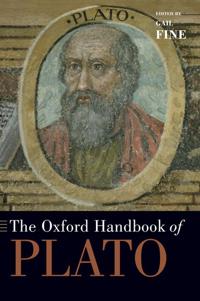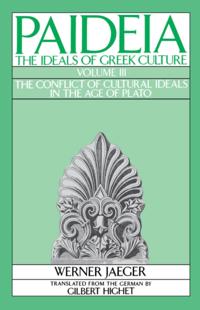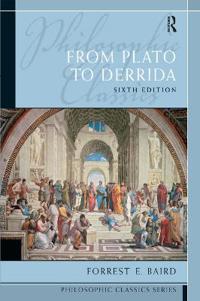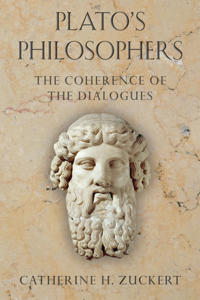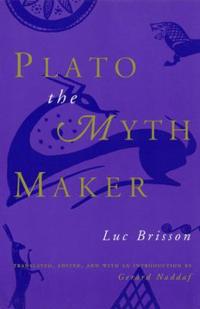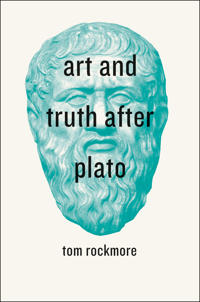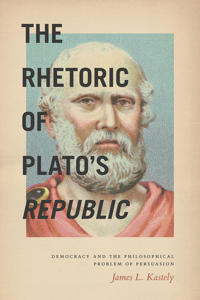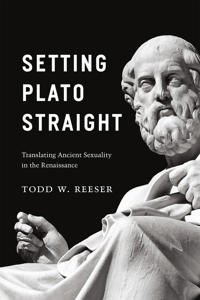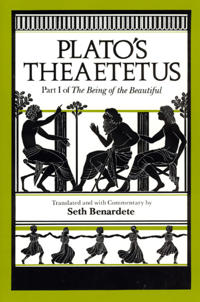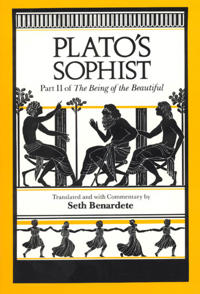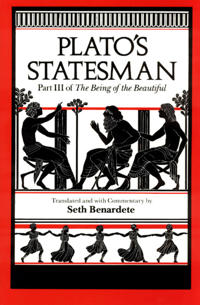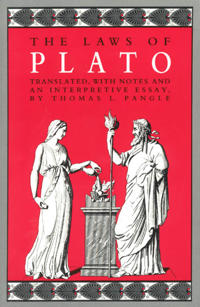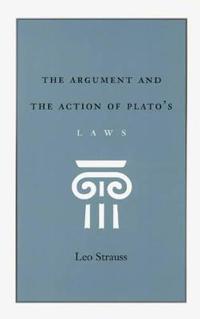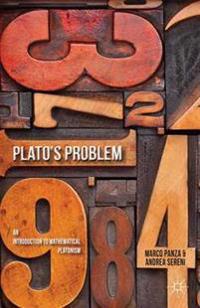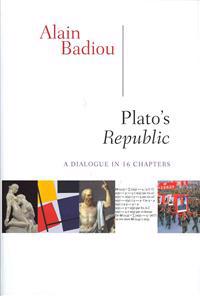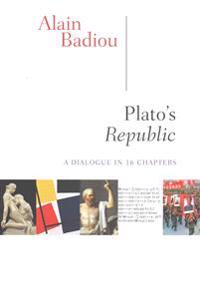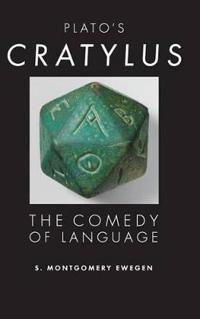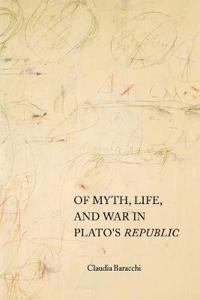Conversation And Self-sufficiency In Plato (Inbunden)
avA. G. Long
ISBN: 9780199695355 - UTGIVEN: 2013-04-11A. G. Long presents a new account of the importance of conversation in Plato's philosophy. He provides close studies of eight dialogues, including some of Plato's most famous works, and traces the emergence of internal dialogue or self-questioning as an alternative to the Socratic conversation from [...]
The Oxford Handbook of Plato
ISBN: 9780199769193 - UTGIVEN: 2011-04Plato is the best known, and continues to be the most widely studied, of all the ancient Greek philosophers. The twenty-one commissioned articles in The Oxford Handbook of Plato provide in-depth and up-to-date discussions of a variety of topics and dialogues. The result is a useful state-of-the-art [...]
Paideia: The Ideals of Greek Culture: Volume III: The Conflict of Cultural Ideals in the Age of Plato
ISBN: 9780199878659 - UTGIVEN: 1986-04Werner Jaegers classic three-volume work, originally published in 1939, is now available in paperback. Paideia, the shaping of Greek character through a union of civilization, tradition, literature, and philosophy is the basis for Jaegers evaluation of Hellenic culture. Volume I describes the found[...]
Plato and Pythagoreanism (Inbunden)
ISBN: 9780199898220 - UTGIVEN: 2013-09Was Plato a Pythagorean? Plato's students and earliest critics thought so, but scholars since the 19th century have been more skeptical. In Plato and Pythagoreanism, Phillip Sidney Horky argues that a specific type of Pythagorean philosophy, called "mathematical" Pythagoreanism, exercised a decisive[...]
From Plato to Derrida (Pocket)
avForrest E. (EDT) Baird
ISBN: 9780205783861 - UTGIVEN: 2010-01Esteemed for providing the best available translations, Philosophic Classics: From Plato to Derrida, features complete works or complete sections of the most important works by the major thinkers, as well as shorter samples from transitional thinkers. First published in 1961, Forrest E. Baird's r[...]
Plato's Philosophers (Pocket)
avCatherine H. Zuckert
ISBN: 9780226007748 - UTGIVEN: 2012-09Faced with the difficult task of discerning Plato's true ideas from the contradictory voices he used to express them, scholars have never fully made sense of the many incompatibilities within and between the dialogues. In the magisterial "Plato's Philosophers", Catherine H. Zuckert explains for the [...]
Art and Truth After Plato (Inbunden)
ISBN: 9780226040028 - UTGIVEN: 2013-07Despite its foundational role in the history of philosophy, Plato's famous argument that art does not have access to truth or knowledge is now rarely examined, in part because recent philosophers have assumed that Plato's challenge was resolved long ago. In "Art and Truth after Plato", Tom Rockmore [...]
Plato the Myth Maker
ISBN: 9780226075181 - UTGIVEN: 1999-05One thinks of a myth as a fictional story, and Plato was the first to use the term "muthos" in that sense. But Plato also used "muthos" to describe the practice of making and telling myths, the oral transmission of all that a community keeps in its collective memory. In the first part of this text, [...]
Plato the Myth Maker (häftad)
ISBN: 9780226075198 - UTGIVEN: 2000-12The word myth is commonly thought to mean a fictional story, but few know that Plato was the first to use the term muthos in that sense. He also used muthos to describe the practice of making and telling stories, the oral transmission of all that a community keeps in its collective memory. In the fi[...]
Art and Truth After Plato (Pocket)
avTom Rockmore
ISBN: 9780226272634 - UTGIVEN: 2015-02Despite its foundational role in the history of philosophy, Plato's famous argument that art does not have access to truth or knowledge is now rarely examined, in part because recent philosophers have assumed that Plato's challenge was resolved long ago. In Art and Truth after Plato, Tom Rockmore ar[...]
The Rhetoric of Plato's Republic
ISBN: 9780226278629 - UTGIVEN: 2015-08Plato isn't exactly thought of as a champion of democracy, and perhaps even less as an important rhetorical theorist. In this book, James L. Kastely recasts Plato in just these lights, offering a vivid new reading of one of Plato's most important works: the Republic. At heart, Kastely demonstrates, [...]
Setting Plato Straight
ISBN: 9780226307008 - UTGIVEN: 2015-12When we talk of platonic love or relationships today, we mean something very different from what Plato meant. For this, we have fifteenth and sixteenth-century European humanists to thank. As these scholars-most of them Catholic-read, digested, and translated Plato, they found themselves faced with [...]
A Commentary on Plato's "Meno" (Häftad)
ISBN: 9780226439594 - UTGIVEN: 1989-07The "Meno", one of the most widely read of the Platonic dialogues, is seen afresh in this original interpretation that explores the dialogue as a theatrical presentation. Just as Socrates's listeners would have questioned and examined their own thinking in response to the presentation, so, Klein sho[...]
Theaetetus (Häftad)
avPlato
ISBN: 9780226670317 - UTGIVEN: 198606"Theaetetus," the "Sophist," and the "Statesman" are a trilogy of Platonic dialogues that show Socrates formulating his conception of philosophy as he prepares the defense for his trial. Originally published together as "The Being and the Beautiful," these translations can be read seperately or as a[...]
Sophist (Häftad)
avPlato
ISBN: 9780226670324 - UTGIVEN: 198606"Theaetus," the "Sophist," and the "Statesman" are a trilogy of Platonic dialgues that show Socrates formulating his conception of philosophy as he prepares the defense for his trial. Originally published together as "The Being of the Beautiful[...]
Plato's Statesman
ISBN: 9780226670331 - UTGIVEN: 1986-06"Theaetetus," the "Sophist," and the "Statesman" are a trilogy of Platonic dialogues that show Socrates formulating his conception of philosophy as he prepares the defense for his trial. Originally published together as "The Being of the Beautiful," these translations can be read separately or as a [...]
The Laws of Plato
ISBN: 9780226671109 - UTGIVEN: 1988-03"The Laws," Plato's longest dialogue, has for centuries been recognized as the most comprehensive exposition of the "practical" consequences of his philosophy, a necessary corrective to the more visionary and utopian "Republic." In this animated encounter between a foreign philosopher and a powerful[...]
The Argument and the Action of Plato's Laws
ISBN: 9780226776989 - UTGIVEN: 1998-05The posthumous publication of The Argument and the Action of Plato's "Laws" was compiled shortly before the death of Leo Strauss in 1973. Strauss offers an insightful and instructive reading through careful probing of Plato's classic text. "Strauss's The Argument and the Action of Plato's 'Laws' ref[...]
Plato's Problem (Häftad)
avGarry Wills
ISBN: 9780230365490 - UTGIVEN: 201301What is mathematics about? And if it is about some sort of mathematical reality, how can we have access to it? This is the problem raised by Plato, which still today is the subject of lively philosophical disputes. This book traces the history of the problem, from its origins to its contemporary tre[...]
Philosophical Temperaments: From Plato to Foucault (Pocket)
avPeter Sloterdijk
ISBN: 9780231153737 - UTGIVEN: 2013-05-28Plato's Republic: A Dialogue in 16 Chapters (Inbunden)
avAlain Badiou, Kenneth Reinhard
ISBN: 9780231160162 - UTGIVEN: 201301Plato's "Republic" is one of the best-known and most widely-discussed texts in the history of philosophy. But how might we get to the heart of this work today, 2,500 years after its original composition? Alain Badiou breathes life into Plato's landmark text and revives its universality. Rather than [...]
Plato's Republic: A Dialogue in 16 Chapters (häftad)
ISBN: 9780231160179 - UTGIVEN: 2015-01Plato's "Republic" is one of the best-known and most widely-discussed texts in the history of philosophy. But how might we get to the heart of this work today, 2,500 years after its original composition? Alain Badiou breathes life into Plato's landmark text and revives its universality. Rather than [...]
Plato's Cratylus (Inbunden)
ISBN: 9780253010445 - UTGIVEN: 2013-11Plato's dialogue Cratylus focuses on being and human dependence on words, or the essential truths about the human condition. Arguing that comedy is an essential part of Plato's concept of language, S. Montgomery Ewegen asserts that understanding the comedic is key to an understanding of Plato's deep[...]
Of Myth, Life, and War in Plato's Republic
ISBN: 9780253214850 - UTGIVEN: 2001-12Although Plato's Republic is perhaps the most influential text in the history of Western philosophy, Claudia Baracchi finds that the work remains obscure and enigmatic. To fully understand and appreciate its meaning, Baracchi argues, we must attend to what its original language discloses. Through a [...]


